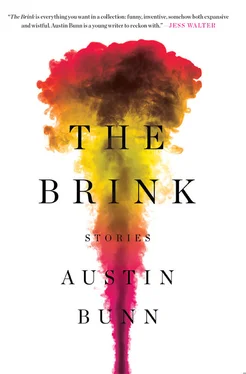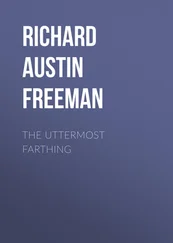Bo shakes his head. He’ll be left behind to take care of you, but that’s not good enough. I want to be with you when we go. You are my gravity, Leah. The only way I can go is to follow you.
Everyone empties out of the kitchen in silence. We go to our rooms to eat our powder + drink their vodka + shed. My job as dispatcher is over. Bo remains in the room, gauging me. He knows how much waiting I’m capable of.
He blinks his eyes catlike + slow, the whole of understanding inside him. “It’s time,” he says.
I go mechanically, so without you, to the laundry room, to my bunk. The washer thumps with a full load. But I see that you’ve left me something! It’s your suitcase next to the bed! I feel so happy. Even if you aren’t here yet, I know that you will be with me, on the bunk above.
I set my applesauce + powder down. I go to the dryer to collect my letters to you. I wrap them in a shoelace + then I open your valise to sneak them into your belongings.
But your suitcase is empty, except for a page ripped from the Upanishads, something you could spare. “I’m not coming back, Michael,” it says. “There is nothing in the sky.”
Bo says that when a star explodes, it leaves behind the darkest energy in the universe. My eyes leak, the last of what’s inside me. This is what it took to get me to zero.
Bo is at the door. He spoons my dose into my mouth. I don’t stop him. The applesauce tastes bitter + gritty, like ashes in mud. Bo pushes me flat, so I rest, his hand brushing my cheekpart. Then, I hear the hum, soft at first but soon it is in my jaw, like my head is pressed against the generator of the ship rending space. Leah, vanisher, you will never know this. When you look up, you will not see us, not the comet only the tail. Not the thing only the going. Then the hum shatters my container, the hum is the blood in my ears + it slows + slows + now Bo with a plastic bag in his
The Worst You Can Imagine Is Where This Starts
The bag looked all wrong, tucked against the wall of the basement near the root cellar, glistening under the bare bulb.
Graham knew he hadn’t put the bag here, and Graham was the only one in the family who put anything down here. The place was a warehouse of his unfinished business, the tool table an open grave: lobotomized light switches, hopelessly knotted crowns of Christmas lights, the radial saw whose cord — the fucking brain stem! — he’d chewed through on the first go.
His wife, Marlena, would venture down into the basement only under duress, in desperate sorties, with a broom in hand to mash spiders. In fact, they now had a special broom just for mashing spiders, the tiny berries of their carcasses poleaxed on the straw. (It lived, unspeakable, at the bottom of the stairs.) Their sixteen year-old daughter, Emma, deemed the basement “sketchy” and also “rapey” and refused to come down. There was a lot of refusing left in her, Graham was learning. So the basement was his alone, to clutter and abandon and befoul. But then, here was this black contractor bag that he had all of nothing to do with.
Graham set down the space heater he’d come for, feeling put-upon. He’d taken a personal day for a morning of triage. They were selling in the spring, if they could get a buyer. If the market didn’t shit itself again, if he could get this basement cleaned and maybe paneled and deem it a room. He’d work until Em came home for lunch — most days, she bolted from school, what she once called “the hellscape.” They would have a wary, silent lunch together like strangers at a cafeteria, Em’s head down, not making eye contact, eating a grilled cheese he’d make for her, and scrolling her phone for a drip of validation.
His attention went to the open window. He remembered Marlena saying that she’d opened them to “let the must out,” must being whatever made their clothes smell ripe and subterranean, though Graham believed (it wasn’t worth the argument) that the open windows let the must in , that the must was inside the house, a part of it now, generations of sweat on the wood. But they were selling soon. It would be someone else’s must.
Marlena had found three grassy, charmed acres at Five Mile, outside Grand Rapids, where they’d build. It was their dream, their best-case scenario. They were on the verge of themselves. They had Emma young, and Emma had been hard. First night terrors, then quaking shyness, and most recently weeklong silences to punish them for their interest in her life. She treated Graham like he was a parole officer, sensing judgment in her every move, and offered glimpses of her personality only when she wanted special dispensations. She had one friend, a redhead named Helena who said nothing to them, ever, a statue with freckles whose parents were divorcing and left her needy, and together they could vanish into black holes of time. At last, though, Em had come into a boy period, and what self-immolating energy that consumed her now found direction. Already, two different boys with inky hair and piercings had come to the door for her, and the horizon of her departure from their daily lives was in view. Graham and Marlena had spoken to an architect, even rolled that appointment into drinks for the two of them. The silhouette in Graham’s mind: a wood-timbered ranch with a raked slate roof, floor-to-ceiling windows on the side facing the grasses, obscene amounts of light. . He would tell Josh and Delia at work that after two decades ferrying copy and deliberating offsets, he’d get to know every joist and stud in the house personally. His hands would finally get dirty.
Graham’s attention circled back to the bag. Someone fleeing the police had thrown it through the window, he decided. There were drugs inside it — he imagined a Tide-like mound of cocaine. The neighborhood had tipped, hadn’t it? A few weeks ago, a rental property up the street had its porch set on fire. Their next-door neighbor, a young plumber named Aaron, had just adopted a German shepherd “for protection,” an animal now digging holes under their shared fence and barking neurotically at squirrels. Graham and Marlena moved in when Em was just two, when the area was up and coming. But it never quite came. An alarm company had come through and he’d noticed their neighbors all had the signs jabbed into their front flower beds. Every window, every door, wired. Marlena had refused. “I don’t want to live in a terrified world,” she’d said.
But the window, Graham saw, was intact, the screen in place. So the bag had been placed there from inside.
Graham picked it up. Something inside was dense and jointed and uncocaine-like. He set it on the tool table, and undid a knot in the plastic. A fetid smell gusted out, enough to make him recoil.
Later, that dark bloom of plastic, opening in his hands, was what he could not stop thinking of: the moment before , when he had the choice to stop, to tie it up and fling it into the trash, and never see the corpse. Inside the bag, the baby was facing down, almost deferentially, its back to him. It was a mercy to have not seen its face. The skin was still speckled with birth. Graham would remember the ashen color and the scale of it, six months along, too small to be full-term, for the rest of his godforsaken life.
He walked over to the slop sink and heaved. His hands closed the bag, shaking convulsively, and cinched it with a contractor tie. His thoughts spiraled into thinking about Em, this stranger who was his daughter. How could they have missed the months of her showing or the sickness — Marlena had been bedridden for months with her — or the advances of one of her pierced suitors, these friends with benefits?
Graham couldn’t leave the bag on the table, or the basement floor. He didn’t want it to touch anything in the house, to deposit a residue of itself on their lives. He gathered himself, by some ancient instinct, and walked out into the backyard.
Читать дальше











